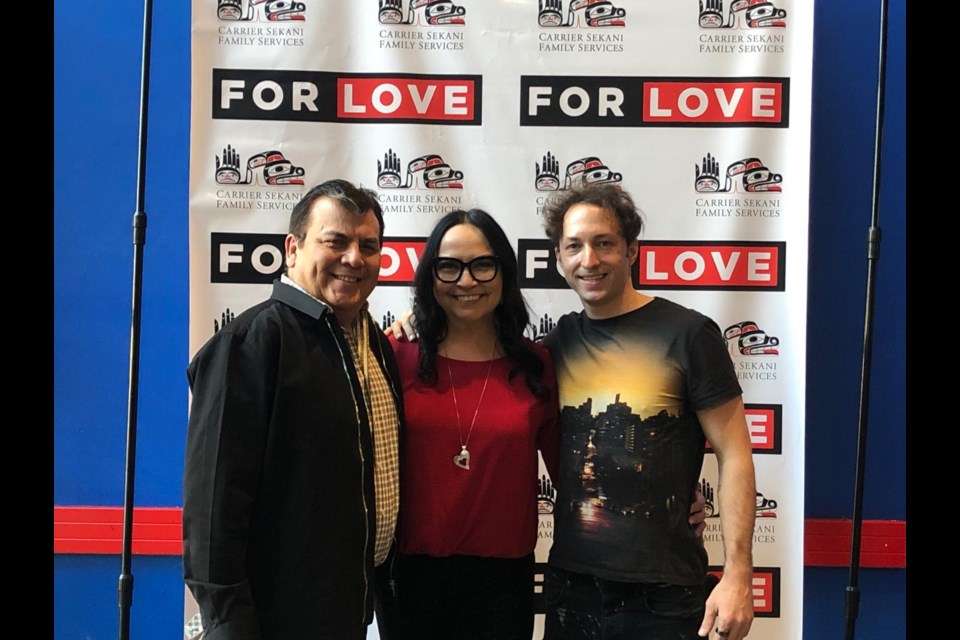On Valentine’s Day a sold-out crowd gathered at Cineplex’s Famous Players Six theatre for the first screening in the north of the documentary For Love.
The award-winning film seeks to illuminate the linkage between residential schools and the over-representation of Indigenous children in the child welfare system.
Prior to the 7 p.m. screening the filmmakers, participants and dignitaries gathered for a screening and question and answer session.
“Regardless of all the atrocities that have happened to us as Indigenous people, all of the heartbreak and the hurt and everything, we still have our culture and we still have the beauty of us as Indigenous people,” said Mary Teegee, who co-wrote the film with director Matt Smiley.
Teegee said it was important that the film was being shown on Valentine’s Day and in the north.
“It is really important for our children, regardless of where they are, that they know they are special and they know they are loved.”
The film and is the second production from Teegee and Smiley; the first being the critically acclaimed 2015 film The Highway of Tears.
For Love was a project that came out of the 2016 human rights tribunal decision that found the federal government discrimination against First Nations children by underfunding the on-reserve child welfare system.
Ottawa also announced Jan 4 that it had secured a $40 billion agreement in principle to compensate First Nations children harmed by its underfunding of child welfare and reforming the system over five years.
“There was money to take care of children once they were in care but not to prevent it, so once we won that big Canadian Human Rights tribunal order we wanted to show what you can do with the funding […] and it was really to film what prevention looks like and the importance of culture,” said Teegee.
“I think it was also really important for us to show there was a reason that children were in care that it wasn’t anyone’s fault. That it wasn’t the child’s fault. It wasn’t the parent’s fault. It is because of all the atrocities that happened because of the impacts of residential school and colonization.”
While the documentary illuminates the linkage between residential schools and the child welfare system, it also focuses on how Indigenous people in Prince George, northern B.C. and across the country are revitalizing culture to strengthen children, families, and Nations.
The film was shot throughout Canada from the east to the west coasts and as far north as Nunavut.
“I think it was one of the most beautiful blessings in my life because we got to do something where we really got to drop into a lot of different communities,” said Smiley, adding that at one point during filming the pair had taken 19 planes in 21 days.
“Both of us were equally shocked and equally touched by some of the great things in Canada and some of the terrible things, and that is really how our dialogue started and how the writing and the creation of this started and it is a labour of love and a friendship.”
Teegee said that despite regional differences across the country she kept seeing the same mantra again and again that “everything we do as Indigenous people is for the love of our children.”
“What was really uplifting was that in every territory, everywhere that we went, was a gracious welcoming that they gave us but also that they were so honoured to celebrate their culture and it is still very much alive.”
For Love is narrated by singer Shania Twain and produced by Carrier Sekani Family Services (CSFS) in Prince George and Walking Tall Productions, Inc.
“She’s always put her heart out for the children, and she stepped up to the plate using her global superstardom, and she really is an icon, and to have that kind of person not just lend their voice but their power, strength and heart to it I think does give a lot of hope,” said Smiley of Twain’s involvement.
The film's executive producers Cindy Blackstock, director of the First Nations Child and Family Caring Society and CSFS CEO Warner Adam have arranged that proceeds from the premier and donations will go towards “Have a Heart Day” activities, Shania Kids Can, and the Sk’ai Zeh Yah Youth Centre.
“While we have collectively come some way to address the inequalities that First Nations people, families and children experience, we haven’t address them all, nor will this 40 billion dollars address them all,” said Blackstock during a question and answer following the first showing.
“I am so proud to see that in this time of cloudiness and darkness that this For Love film is shining that love and light and providing an example of how you can truly celebrate people, honour people, and how you can uplift them while you uplift society at the same time.”



